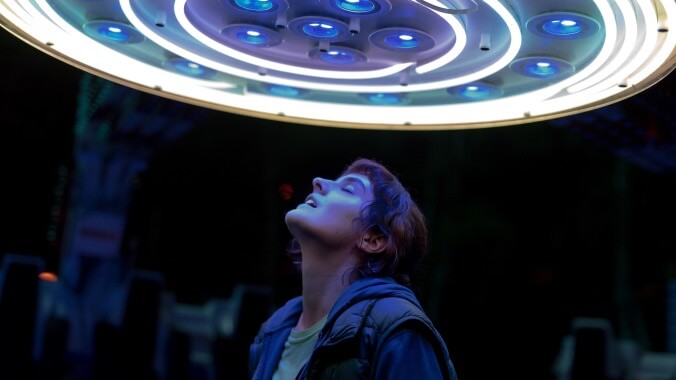A woman falls in love (and lust) with a carnival ride in the quirky, luminous Jumbo


Note: The writer of this review watched Jumbo on a digital screener from home. Before making the decision to see it—or any other film—in a movie theater, please consider the health risks involved. Here’s an interview on the matter with scientific experts.
If you’ve been terminally online for at least a decade, you may remember the video of the woman mounting the Eiffel Tower. Taken from a 2008 British documentary called Married To The Eiffel Tower, the clip went viral in the aftermath of its initial TV airing as rubberneckers around the world gathered on YouTube to gawk at Erika La Tour Eiffel, an American who “married” the tower in 2007 and took her last name. (Although her shape is distinctly phallic, according to Eiffel, the tower is female.) It was many viewers’ first exposure to objectum sexuality, a phenomenon linked to both autism and synesthesia where a human being forms sexual, emotional, and romantic bonds with inanimate objects.
Since then, objectophiles have publicly declared their love for cars, chandeliers, iPads, and bridges in article after article where they plead for acceptance and understanding. But in cinema, that great vehicle of empathy, the canon of stories about people in love with things (think Lars And The Real Girl and Her) is both vanishingly small and dominated by men—which is significant, given that most real-life objectophiles are women. To rectify this imbalance, along comes Jumbo, the feature debut of writer-director Zoé Wittock, in which Portrait Of A Lady On Fire star Noémie Merlant embarks on a torrid affair with a carnival ride. This is a slight film, one that peaks early and spends the rest of its runtime shuffling its narrative cards, re-combining the same elements in different ways. But Jumbo still stands out, thanks to a concept and aesthetic much stronger than its story.
Mostly, this is a character study. Jeanne (Merlant) lives in a provincial Belgian town with her single mom, Margarette (Emmanuelle Bercot), a no-nonsense bartender with more romantic regrets than she can count. It’s implied but never stated outright that Jeanne isn’t like other people; the armchair diagnosis is that she’s on the autism spectrum, given her discomfort in social settings, obsessive interest in machines, and difficulty with eye contact. Margarette keeps trying to set her up with local boys, but Jeanne’s never had romantic feelings toward anyone—that is, until the amusement park where she works introduces a new ride, a tilt-a-whirl Jeanne nicknames “Jumbo.”
Jeanne is a night janitor at the park, which gives her hours alone every night to canoodle with her beloved Jumbo. Early on, Wittock adds a touch of magical-realist wonder to this already quirky film by having Jumbo come to life when no one else is around, tilting its arms toward Jeanne and communicating with her through flashing lights and yawns. It’s as if the spacecraft in Close Encounters Of The Third Kind was flirting with Richard Dreyfuss, and the feeling was mutual. Scenes depicting Jeanne stroking Jumbo radiate a hazy neon aura that turns the park’s riverside setting into an enchanted grotto, and the ride reciprocates by scooping her up and swirling her around as she giggles in lovestruck bliss. The two even have sex, imagined here in a Jonathan Glazer-esque sequence where a half-nude Merlant is covered in the thick black oil that drips from Jumbo’s joints.
But the relationship is too pure for this world. About a half hour in, Jeanne decides to introduce her mom to a guy she met at work; at first, Margarette is overjoyed, thinking that her attempts to pair Jeanne with milquetoast park manager Marc (Bastien Bouillon) have finally paid off. But once she realizes that Jeanne’s new beau is actually made of steel and weighs several thousand pounds—an epiphany that comes, amusingly enough, as she’s spinning in midair—Margarette’s excitement curdles into horror and shame. The aftermath of this realization takes up the rest of Jumbo’s 95-minute runtime, digging a narrative hole that requires the addition of a new and wholly superfluous character, mom’s new boyfriend Hubert (Sam Louwyck).
The visual language of Jumbo is sensual, making evocative (and surprisingly erotic) use of luminous colored light and gushing water to evoke the film’s core commingling of natural and artificial. Merlant’s performance is similarly thoughtful, making a real character out of one that could have been little more than a collection of quirks. Wittock and Merlant clearly have great empathy for Jeanne, who isn’t hurting anyone but is targeted for cruelty because she is different. And although this affection turns sticky-sweet as the story fumbles for an ending, there’s enough earnestness behind it to let that go. Couples in love are often said to glow. In Jumbo, that sentiment is literal.